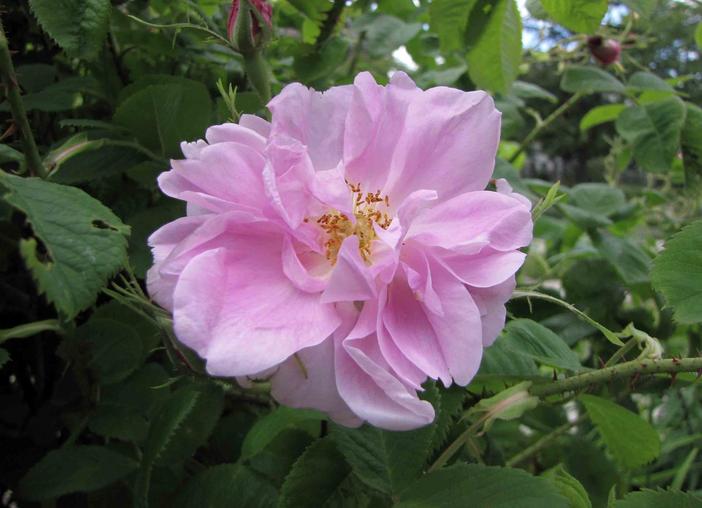Damask Rose
(Rosa ×damascena)
Damask Rose (Rosa ×damascena)
/
/

阿橋花譜 HQ Flower Guide
CC BY-SA 2.0
Image By:
阿橋花譜 HQ Flower Guide
Recorded By:
Copyright:
CC BY-SA 2.0
Copyright Notice:
Photo by: 阿橋花譜 HQ Flower Guide | License Type: CC BY-SA 2.0 | License URL: https://creativecommons.org/licenses/by-sa/2.0/ | Uploader: 阿橋 KHQ | Publisher: Flickr







Estimated Native Range
Summary
Rosa ×damascena, commonly known as Damask Rose, is a deciduous shrub native to the Middle East, particularly Syria, and has been cultivated for its fragrant flowers since ancient times. It typically grows to 2.2 meters (7 ft 3 in) tall with stems densely armed with stout, curved prickles and stiff bristles. The leaves are pinnate with five (rarely seven) leaflets. The flowers, which bloom in spring and early summer, are light to moderate pink to light red and grow in clusters. The informal shape of the bush and the showy, fragrant blooms make it a favorite among gardeners.
The Damask Rose is celebrated for its intense fragrance and is a key ingredient in the perfume industry. The flowers are harvested for rose oil, rose water, and "rose concrete." The petals are also edible and can be used in culinary dishes, as a garnish, in herbal teas, or preserved as gulkand. This rose is optimally cultivated in hedge rows to protect the blooms from wind and facilitate harvesting. Harvesting is labor-intensive, with a brief 20–40 day period for gathering flowers by hand for distillation. In gardens, Damask Rose is valued for its beautiful flowers and fragrance, often used in border planting or as a specimen shrub. It requires full sun and medium water, thriving in a range of soil drainage conditions. While generally disease-resistant, it can be susceptible to common rose ailments such as black spot and powdery mildew.CC BY-SA 4.0
The Damask Rose is celebrated for its intense fragrance and is a key ingredient in the perfume industry. The flowers are harvested for rose oil, rose water, and "rose concrete." The petals are also edible and can be used in culinary dishes, as a garnish, in herbal teas, or preserved as gulkand. This rose is optimally cultivated in hedge rows to protect the blooms from wind and facilitate harvesting. Harvesting is labor-intensive, with a brief 20–40 day period for gathering flowers by hand for distillation. In gardens, Damask Rose is valued for its beautiful flowers and fragrance, often used in border planting or as a specimen shrub. It requires full sun and medium water, thriving in a range of soil drainage conditions. While generally disease-resistant, it can be susceptible to common rose ailments such as black spot and powdery mildew.CC BY-SA 4.0
Plant Description
- Plant Type: Shrub
- Height: 5-7 feet
- Width: 6-9 feet
- Growth Rate: Moderate
- Flower Color: Pink, Red
- Flowering Season: Summer, Fall
- Leaf Retention: Deciduous
Growth Requirements
- Sun: Full Sun
- Water: Medium
- Drainage: Slow, Medium, Fast
Common Uses
Bee Garden, Bird Garden, Butterfly Garden, Fragrant, Salt Tolerant, Showy Flowers
Natural Habitat
Native to the Middle East, particularly Syria
Other Names
Common Names: Multiflora Rose, Damaszener-Rose, Rosier De Damas, Damascenerros, Damaszener Rose
Scientific Names: , Rosa ×damascena, Rosa ×bifera, osa polyanthos R, Rosa ×damascena var. trigintipetala, Rosa ×damascena var. variegata, Rosa calendarum, Rosa centifolia var. bifera, Rosa gallica var. damascena,
GBIF Accepted Name: Rosa ×damascena Mill.